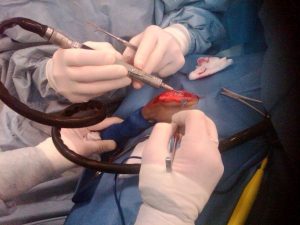For the past several years, we have been hearing more about stem cell research. In some cases, we are talking about cloning entire animals or even people. In other cases, there have been reports regarding stem cell cures for diseases we never thought possible. There has also been a lot of debate about the ethics and morality involved in things like stem cell research involving cloning and how to deal with cells from certain types of tissue.
 These conversations will likely continue long in the future, and many of the applications are more in the science fiction stage than anywhere close to real world use. However, there is work being done today on a more modest scale that may bring actual relief to patients sooner rather than later.
These conversations will likely continue long in the future, and many of the applications are more in the science fiction stage than anywhere close to real world use. However, there is work being done today on a more modest scale that may bring actual relief to patients sooner rather than later.
Such treatments should be approached with skepticism, given reports of unscrupulous stem cell treatment and research centers that have left patients seriously and permanently injured.As discussed in a recent news article from Boston University News Service, there is an experimental stem cell therapy in the works that could treat damaged cartilage in the human knee and thus replace the need to have total knee replacement for many patients.
One of the common reasons patients need a knee replacement is because, over time, the cartilage in a person’s knee can degenerate. The purpose of this cartilage is to act as a shock absorber. This will not only reduce the impact, but it will prevent bone from hitting bone. Once the cartilage is gone, and the bones start hitting and grinding, this well lead to arthritic formations that will only make the joint weaker and the pain greater.
In some patients, such as the one featured in the article, a degenerative disease like ostechondritis dissecans (OCD) can occur at much younger age, such as in teens. This can leave a young victim feeling like he or she is 80 years old, as discussed in the article. Previously, a patient would consider a total knee implant. This is a problem at a young age, because the devices are only rated to last around 10 to 20 years. This is not so critical for an actual 80-year-old patient, but a 13-year-old patient will need multiple painful knee replacements during the rest of his or her life.
It should be noted, that if you have had a total knee replacement, and the device has failed in less than 10 years or you are in severe pain, you should contact an experienced defective knee replacement lawyer in Boston to see if you have a valid claim. This is especially true if your doctor tells you that you will need to have a second or subsequent surgery to have a new artificial knee implant.
However, with this new technique, the hope is that a patient can have stem cells implanted, and they will allow the body to regrow the cartilage so as to obviate the need for a total knee replacement operation. This technique is much less invasive, as well. A surgeon will make a small incision and retract the skin. He or she will then drill several small holes in the remaining cartilage and inject a gel containing stem cells. He or she will then smooth them down and stitch the patient’s wound.
Call the Boston Jeffrey Glassman Injury Lawyers for a free and confidential appointment — (617) 777-7777.
Additional Resources:
Experimental Stem Cell Therapy Could Treat Damaged Knee Cartilage, April 24, 2017, By Dara Farhadi, Boston University News Service
More Blog Entries:
FDA Announces Testosterone Meds Must Carry Broader Warning, July 7, 2014, Boston Products Liability Lawyers Blog
 Product Liability Lawyer Blog
Product Liability Lawyer Blog

